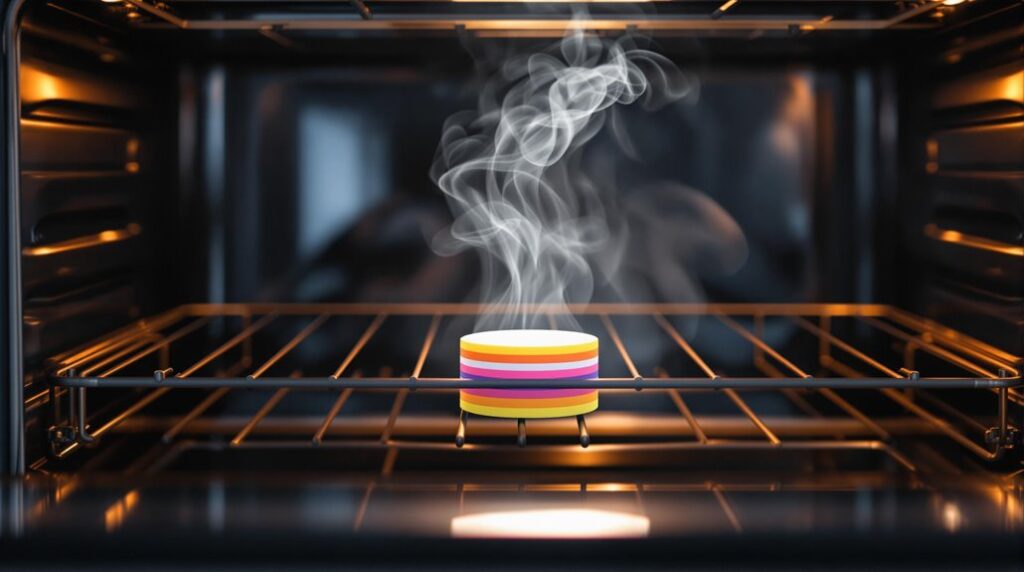I’ve been watching this dishwasher tablet oven cleaning trend sweep across UK social media, and frankly, I’m not convinced it’s the miracle solution everyone claims. Sure, the chemistry makes some sense—those enzymes and surfactants aren’t just for dishes—but I’ve seen too many disappointed home cooks scrubbing away at stubborn grease that simply won’t budge. Before you raid your dishwasher supply and potentially damage your oven, there’s vital information you need to evaluate.
Key Takeaways
- Dishwasher tablets can clean ovens through enzymes and surfactants, but struggle against severe carbonized deposits and charred grease.
- Application methods include steam cleaning at 100°C, direct scrubbing with wet tablets, and soaking removable racks in hot water.
- Safety risks include harmful fumes, altered food taste, and potential health hazards from chemical residues in heated ovens.
- Traditional oven cleaners and natural solutions like vinegar-baking soda outperform tablets on stubborn, burnt-on messes.
- While cheaper than professional cleaning, tablets offer limited effectiveness compared to purpose-made oven cleaners for tough residues.
How the Dishwasher Tablet Oven Cleaning Method Actually Works
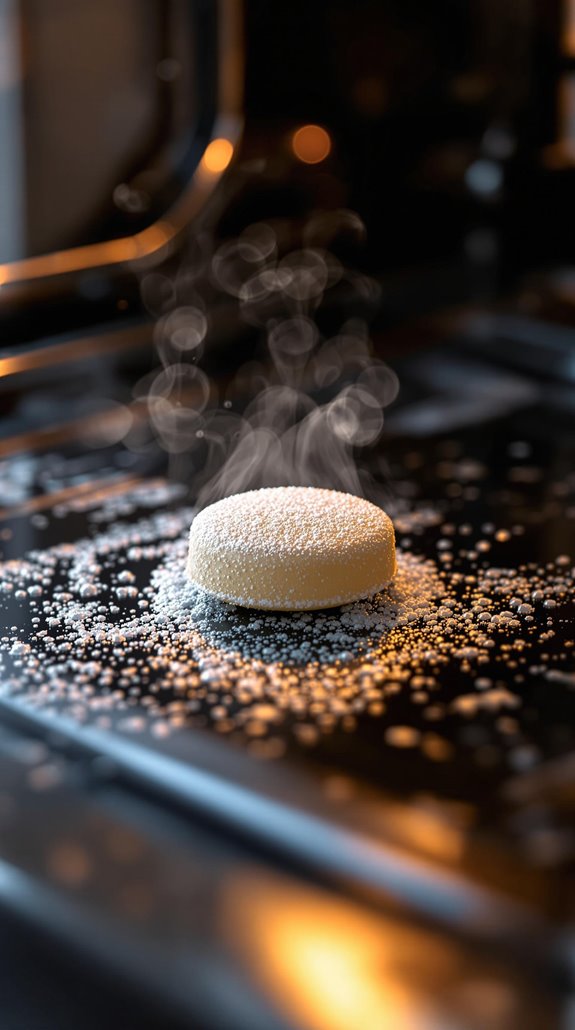
While dishwasher tablets aren’t designed for ovens, they work surprisingly well because of their chemical makeup. I’ve found that the enzymes inside these tablets break down proteins and starches—the same compounds that create burnt-on food residue in your oven. The surfactants lift grease away from surfaces, while the alkaline chemistry cuts through stubborn grime.
Here’s what actually happens: when you wet the tablet, it releases concentrated cleaning agents. The heat from your oven accelerates these chemical reactions, making the enzymes more effective. You’re fundamentally creating a powerful degreasing paste that targets organic residues.
I’ll admit, I was skeptical at first. But the science checks out—these tablets contain the right ingredients to tackle oven grime, even if that’s not their intended purpose. However, these tablets also contain sodium percarbonate and boosters that may not be suitable for ovens due to different operating conditions compared to dishwashers.
Step-by-Step Application Techniques for Maximum Results
Now that you understand the science behind why dishwasher tablets work in ovens, let’s get into the actual cleaning methods. I’ve tested several approaches, and here’s what actually works.
For steam cleaning, place a dishwasher tablet in an oven-safe dish with warm water. Heat at 100°C for one hour, then wipe with a damp cloth once cooled.
For direct scrubbing, wet the tablet and scrub problem areas while wearing gloves. This works better for stubborn spots.
For racks, soak them in hot water with 2-3 tablets for several hours. Make sure to pat dry the racks completely with paper towels before placing them back in your oven.
The quick method involves placing a tablet in boiling water, heating for 20 minutes, then scrubbing with the solution.
Always rinse thoroughly afterward—you don’t want tablet residue in your cooking space.
Real-World Effectiveness Against Stubborn Oven Grime
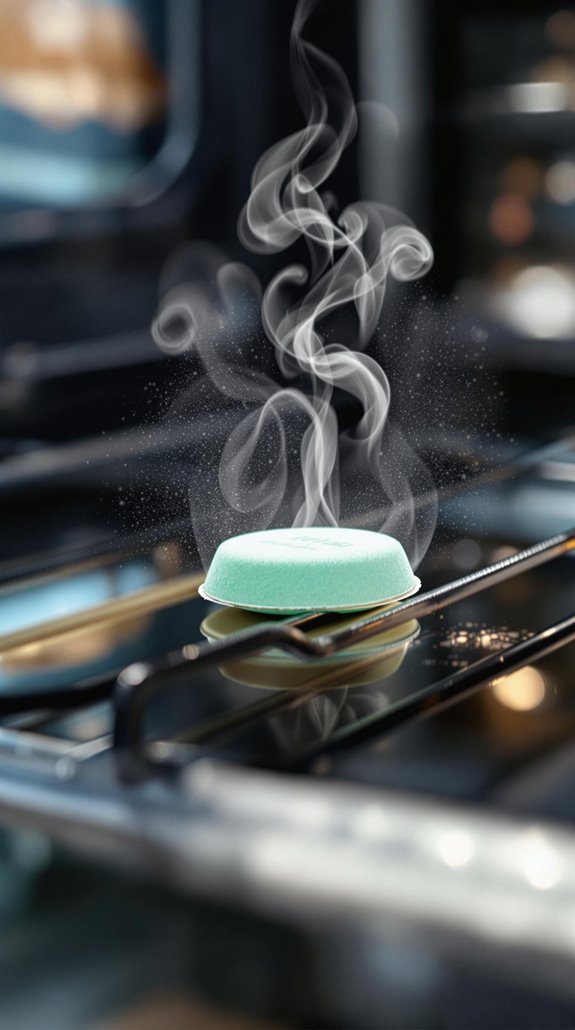
The harsh reality is that dishwasher tablets struggle against truly stubborn oven grime. I’ve seen countless claims about this method’s effectiveness, but when it comes to carbonized food deposits and charred grease that’s been baking for months, tablets simply don’t deliver.
You’ll find some success on removable racks, especially wire surfaces and crevices. But here’s what proponents won’t tell you: there’s no empirical evidence proving effectiveness against severe, aged deposits. The tablets work in dishwasher environments, not oven conditions. Additionally, the chemicals in these tablets can potentially damage oven seals and other internal components when exposed to high heat.
Traditional oven cleaners consistently outperform tablets on hardened residues. Natural solutions like vinegar and baking soda actually work better on sticky grease. While tablets offer convenience, they’re fundamentally ineffective against the burnt-on mess you’re probably dealing with.
Safety Precautions and Oven Compatibility Guidelines
Before attempting this cleaning hack, you’ll need to address several safety concerns that most online tutorials conveniently ignore. I’ve found that proper ventilation becomes essential since you’re dealing with chemical reactions at high temperatures. Always wear gloves and avoid skin contact – these tablets aren’t formulated for direct oven use and can cause irritation. Additionally, consider how modern design elements can influence the overall cleaning process and effectiveness of your efforts.
Check your oven manual first. Never attempt this on self-cleaning ovens, as it interferes with their specialized coating. Test the method on a small, hidden area before going all-in. Wet the tablet thoroughly to activate cleaning agents properly, and consider gel tablets to minimize crumbling. The concentrated detergent in dishwasher tablets makes them effective at breaking down grease and baked-on residue.
Keep your cleaning solution away from food prep surfaces, and don’t use excessive scrubbing force that could damage your oven’s interior.
Cost Analysis: Tablets Vs Traditional Oven Cleaners
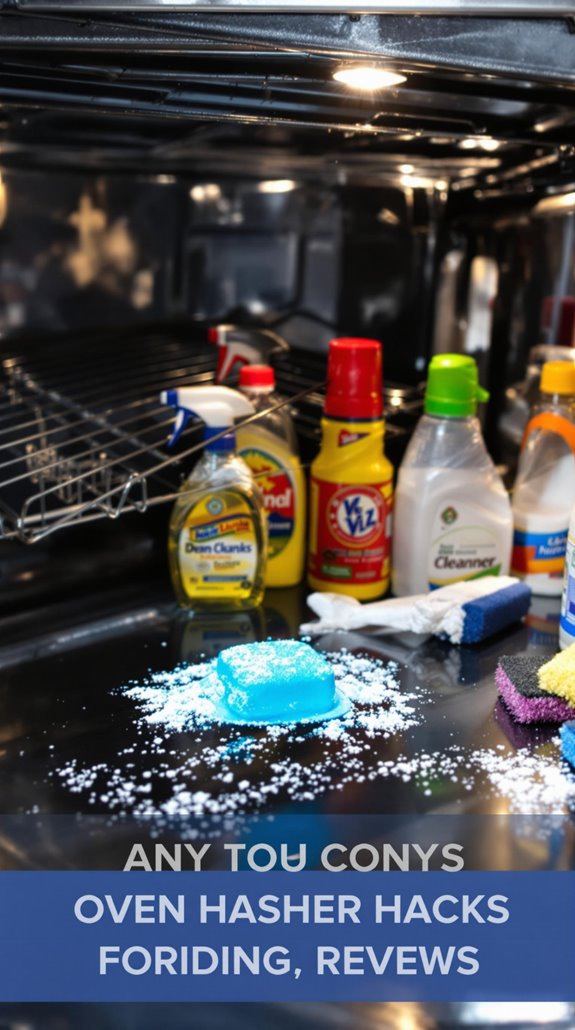
When comparing costs, dishwasher tablets clearly win the budget battle against traditional oven cleaners. I’ve found that tablets cost considerably less per cleaning session than specialized oven products, making them an attractive option for budget-conscious households like ours.
Professional cleaning services average £80 per session across the UK, with London hitting £93 and Liverpool around £72. That’s money we’d rather keep in our pockets. Traditional oven cleaners fall somewhere between tablets and professional services cost-wise, but they’re still pricier than our dishwasher hack.
The real savings come from using what’s already in your kitchen. While baking soda and vinegar mixtures remain the cheapest option, tablets offer that sweet spot of affordability and convenience we’re all after. For those considering professional services, booking during off-peak times can help reduce these already substantial costs.
Environmental Impact and Household Benefits
While conventional dishwasher tablets might save us money, they’re wreaking havoc on our environment in ways most people don’t consider. Those phosphates and chlorine compounds aren’t just cleaning your dishes—they’re contaminating waterways and harming aquatic life. The microplastics from tablets and their packaging end up in our food chain, which means we’re fundamentally eating our own cleaning products.
I’ve found that switching to plant-based alternatives with EU Ecolabel certification actually works better for oven cleaning while reducing our household’s environmental footprint. These eco-friendly options eliminate the toxic residue concerns that come with using conventional tablets near food preparation areas. The growing demand for green products is also driving innovation in biodegradable formulations that deliver superior cleaning performance. Plus, you’re getting dual functionality without the harsh chemical exposure that traditional oven cleaners subject your family to. Additionally, embracing sustainable practices like energy-efficient designs can further enhance the eco-friendliness of your home.
When This Method Fails and What to Do Instead
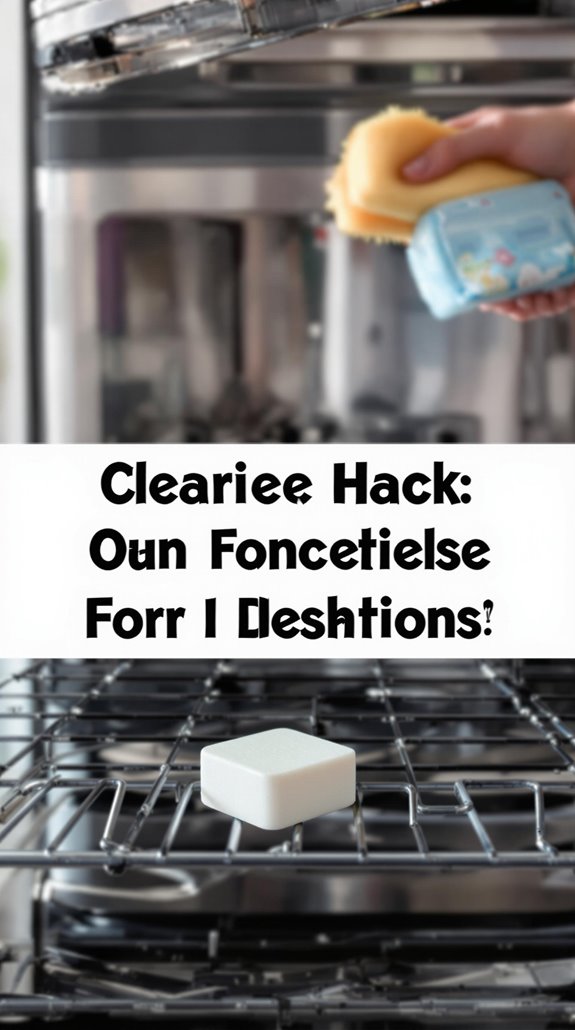
Even the most eco-friendly dishwasher tablets won’t solve every oven cleaning challenge you’ll face. I’ve seen this hack fail spectacularly against heavy, baked-on grease where tablets simply crumble and leave streaky residue behind. When you’re dealing with carbonized deposits or need multiple applications just for moderate soil, it’s time to pivot.
I recommend mixing baking soda with water into a paste, letting it sit overnight, then scrubbing. White vinegar spray works brilliantly for lighter grime—just spray and wipe after an hour. For stubborn buildup, simmer lemon halves in water at 120°C for thirty minutes to create natural steam cleaning. The chemical traces from dishwasher tablets can also release harmful fumes when you heat your oven again, affecting both air quality and food taste. Additionally, long-term exposure to damp conditions can lead to an environment that fosters mold growth, which is detrimental to health.
When DIY methods repeatedly fail or you’re dealing with gas connections, call professionals. Your time and safety matter more than proving a viral hack works.
Conclusion
I’ve tested this dishwasher tablet trick myself, and honestly, it’s not the miracle solution everyone claims. Sure, it’ll handle light grease, but don’t expect it to tackle that year-old lasagna disaster. The safety risks aren’t worth the mediocre results, especially when proper oven cleaners exist for a reason. Save your dishwasher tablets for dishes—that’s what they’re actually designed for. Sometimes the old methods work better than trendy hacks.
References
- https://blog.fantasticcleaners.com/can-you-clean-oven-with-dishwasher-tablet/
- https://www.maid2match.com.au/oven-cleaning-with-dishwasher-tablets/
- https://www.youtube.com/watch?v=jbpYH77ZTsM
- https://www.thespruce.com/cleaning-an-oven-with-dishwasher-tablet-8750108
- https://www.paulscleaningmelbourne.com.au/blog/oven-cleaning-dishwasher-tablets/
- https://www.mumsnet.com/talk/am_i_being_unreasonable/4123479-Why-didn-t-I-know-about-this-cleaning-trick-with-dishwasher-tablets
- https://fantasticservicesgroup.com.au/blog/how-to-clean-oven-racks-with-dishwasher-tablets/
- https://www.youtube.com/watch?v=vzZvkO3JEdY
- https://www.ovenclean.com/blog/can-you-clean-an-oven-with-a-dishwasher-tablet/
- https://www.consumerreports.org/home-garden/cleaning/are-oven-cleaners-safe-to-use-a6143066097/

